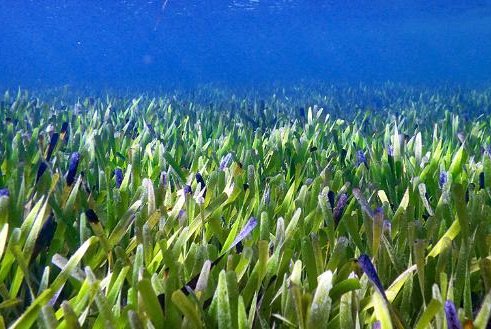1 of 2 | The ancient seagrass Posidonia australis in western Australia's Shark Bay is earth's largest single plant, according to University of Western Australia researchers Wednesday. Photo by Rachel Austin/UWA.
June 1 (UPI) -- Researchers in Australia have stumbled upon earth's largest known plant that stretches more than a hundred miles and has survived thousands of years, according to a study published Wednesday.
The ancient seagrass Posidonia australis, or ribbon weed, covers 112 miles in western Australia's Shark Bay and is estimated to be about 4,500 years old, according to researchers at the University of Western Australia.
Biologists had originally planned to study the genetic diversity of seagrass meadows in Shark Bay, but instead found a single plant or 'clone' in the shallow sun-drenched waters, according to the study published Wednesday in Proceedings of the Royal Society B.
UWA student researcher Jane Edgeloe said the team sampled seagrass shoots from different environments throughout the bay to generate a "fingerprint" using 18,000 genetic markers.
"The answer blew us away! There was just one," Edgeloe said in a press release. "That's it, just one plant has expanded over [111 miles] in Shark Bay, making it the largest known plant on earth."
The enormous seagrass does not reproduce and instead came from a single, colonizing seedling that grew for thousands of years. It is also a polyploid, containing 100% of the genome from each parent rather than sharing 50%.
"Polyploid plants often reside in places with extreme environmental conditions, are often sterile, but can continue to grow if left undisturbed, and this giant seagrass has done just that," said study senior author Elizabeth Sinclair, an evolutionary biologist at UWA Oceans Institute.
Ecologist Martin Breed at Flinders University, which also participated in the study, said the plant's long survival despite being sterile is unusual.
"Plants that don't have sex tend to also have reduced genetic diversity, which they normally need when dealing with environmental change," told The Guardian.
Sinclair said researchers plan to conduct more experiments on the massive plant to understand how it can survive and thrive in the bay's variable conditions.
"Even without successful flowering and seed production, it appears to be really reliant, experiencing a wide range of temperatures and salinities plus extreme high light conditions, which together would typically be highly stressful for most plants."















